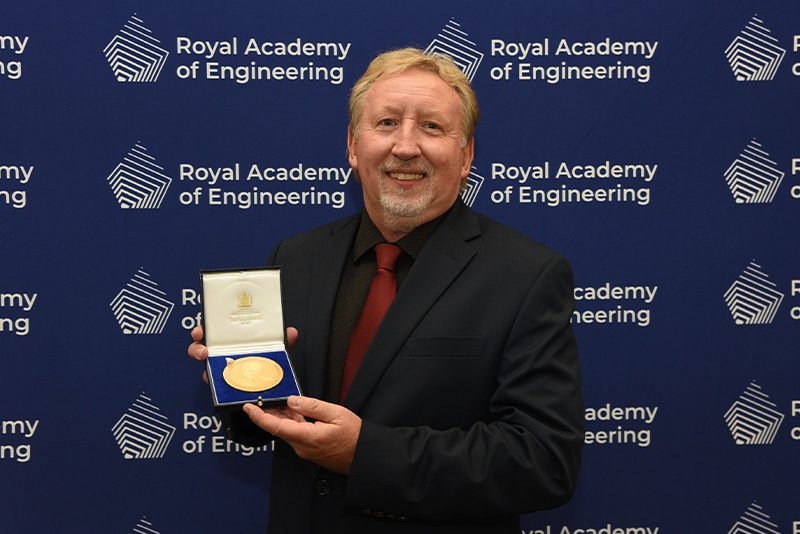
Graham Reed awarded the Sir Frank Whittle Medal by the Royal Academy of Engineering
Professor Graham Reed, Director of the Optoelectronics Research Centre (ORC) and Co-Investigator of the Future Photonics Hub, recently received the Sir Frank Whittle medal, one of the Royal Academy of Engineering’s (RAEng) highest accolades. The award was presented to Graham at the Academy’s AGM in September by Sir Jim McDonald, the president of the RAEng, in recognition of his pioneering work in the field of Silicon Photonics.
Named after the inventor of the jet engine, the Sir Frank Whittle Medal is awarded to an engineer resident in the UK whose outstanding and sustained achievements have had a profound impact on their field of study. Previous winners include Robert Benaim (2019), Professor Dame Julia Higgins (2020) and Dr Clive Hickman (2021).
Upon learning of his award, Graham said: “I’m delighted and humbled to receive the Sir Frank Whittle Medal. It is an honour to be added to such an eminent list of previous winners.”
He added: “This medal is recognition for a contribution to engineering over a sustained period, and I must say that this is only possible with an excellent team. Therefore, I must pay tribute to members of my Silicon Photonics Group past and present. I have been fortunate to be able to recruit excellent individuals over a period of more than 30 years, many of whom are now world leaders themselves, so I regard this award as being as much for them as for me.”
Graham is a pioneer in the field of Silicon Photonics and he has remained at the forefront of the field for over 30 years. He founded the Silicon Photonics Group in 1989 at the University of Surrey where he later became head of the Department of Electronic Engineering. In April 2012, Graham brought his team to the University of Southampton and, since then, he has contributed to its world-leading reputation, initially serving as Deputy Director and now Director of the ORC. He and his team are particularly well-known for having published the first design of a depletion modulator, now an industry standard, as well as landmark high-speed modulators over the past two decades.
During his time at the ORC, Graham has acted as a Principal and Co-Investigator on grants amounting to over £67 million, published almost 650 journal and conference papers, and authored 23 patent applications. He is a respected figure in the field and is regularly invited to present at major Silicon Photonics conferences worldwide. He is currently a member of 6 international conference committees, including serving as co-chair of the Silicon Photonics symposium at SPIE Photonics West conference. He is a Fellow of the Royal Academy of Engineering, the SPIE, the IET, Optica and the European Optical Society (EOS).
The commercial success of Silicon Photonics underscores its importance. It has revolutionised data centre communications and is beginning to impact every aspect of modern life from artificial intelligence to computing, healthcare to imaging, and security to environmental monitoring. The first Silicon Photonics company in the world, Oclaro (formerly known as Bookham Technology) was founded by Dr. Andrew Rickman, one of Graham’s PhD students, and is one of the leading optical sub-system companies in the world. Graham himself has also contributed to the entrepreneurial landscape, co-founding the startup company Pointcloud Inc., which has achieved world-leading results in integrated LIDAR systems.
Supporting his nomination, Professor Sir David Payne, former Director of the ORC, said: “There would be no Silicon Photonics technology today without Graham Reed. He initiated the field, pioneered much of the early work, demonstrated its viability, and today has a plethora of world firsts to his credit.”